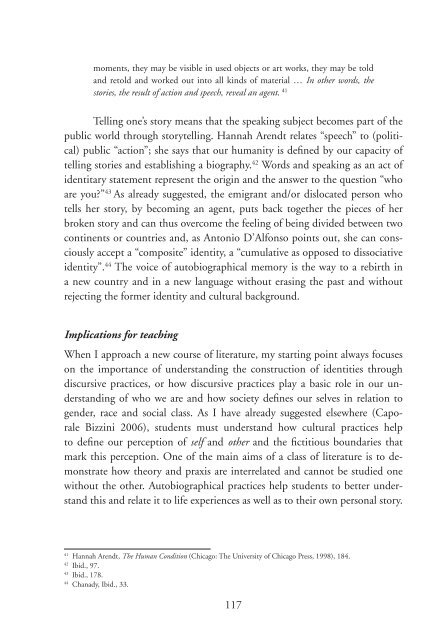Teaching Subjectivity. Travelling Selves for Feminist ... - MailChimp
Teaching Subjectivity. Travelling Selves for Feminist ... - MailChimp
Teaching Subjectivity. Travelling Selves for Feminist ... - MailChimp
Create successful ePaper yourself
Turn your PDF publications into a flip-book with our unique Google optimized e-Paper software.
moments, they may be visible in used objects or art works, they may be told<br />
and retold and worked out into all kinds of material … In other words, the<br />
stories, the result of action and speech, reveal an agent. 41<br />
Telling one’s story means that the speaking subject becomes part of the<br />
public world through storytelling. Hannah Arendt relates “speech” to (political)<br />
public “action”; she says that our humanity is defined by our capacity of<br />
telling stories and establishing a biography. 42 Words and speaking as an act of<br />
identitary statement represent the origin and the answer to the question “who<br />
are you?” 43 As already suggested, the emigrant and/or dislocated person who<br />
tells her story, by becoming an agent, puts back together the pieces of her<br />
broken story and can thus overcome the feeling of being divided between two<br />
continents or countries and, as Antonio D’Alfonso points out, she can consciously<br />
accept a “composite” identity, a “cumulative as opposed to dissociative<br />
identity”. 44 The voice of autobiographical memory is the way to a rebirth in<br />
a new country and in a new language without erasing the past and without<br />
rejecting the <strong>for</strong>mer identity and cultural background.<br />
Implications <strong>for</strong> teaching<br />
When I approach a new course of literature, my starting point always focuses<br />
on the importance of understanding the construction of identities through<br />
discursive practices, or how discursive practices play a basic role in our understanding<br />
of who we are and how society defines our selves in relation to<br />
gender, race and social class. As I have already suggested elsewhere (Caporale<br />
Bizzini 2006), students must understand how cultural practices help<br />
to define our perception of self and other and the fictitious boundaries that<br />
mark this perception. One of the main aims of a class of literature is to demonstrate<br />
how theory and praxis are interrelated and cannot be studied one<br />
without the other. Autobiographical practices help students to better understand<br />
this and relate it to life experiences as well as to their own personal story.<br />
41<br />
Hannah Arendt, The Human Condition (Chicago: The University of Chicago Press, 1998), 184.<br />
42<br />
Ibid., 97.<br />
43<br />
Ibid., 178.<br />
44<br />
Chanady, Ibid., 33.<br />
117

















